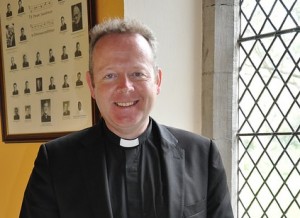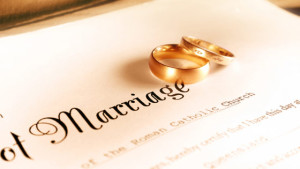
By Sarah Mac Donald - 03 May, 2015
 The Primate of All Ireland has raised concerns over the lack of freedom of speech for those who support the No side in the marriage referendum.
The Primate of All Ireland has raised concerns over the lack of freedom of speech for those who support the No side in the marriage referendum.
In his message ‘Care for the Covenant of Marriage’, which he issued on Saturday evening, Archbishop Eamon Martin asked, “How have we got ourselves into the situation that when people stand up to guard the dignity of difference between a man and woman, and speak for the traditional definition of marriage, they are often portrayed as being against freedom, or against equality?”
“How is it that many people won’t even raise these issues in their families and workplaces for fear of being ridiculed or condemned as homophobic?”
He also challenged the country’s politicians asking, “Could we not expect at least some of our legislators to engage in public discussion on both sides of this debate?”
He said that people of faith believe that the union of a man and a woman in marriage, open to the procreation of children, is a gift from God who created us ‘male and female’.
“But we are also people of reason, who hold to the truth about human sexuality, grounded in the natural law, that the relationship between a man and a woman is unique.”
Discussing the equality argument put forward by the Yes side, Archbishop Martin said what makes marriage unique among other types of relationship is the distinctiveness of the union between a man and a woman which is open to life.
“To remove this specific difference is not, as some would argue, a development or evolution of our understanding of marriage; it is, rather, a very definite break with human history and with the natural institution of marriage.”
He warned that in this situation we end up using the term “marriage” for something that it is not.
According to the Archbishop of Armagh, many of the arguments being made for the proposed amendment appear to be based on a misunderstanding of “equality”.
“It is a fact of nature that same-sex unions are fundamentally and objectively different from the complementary sexual union of a woman and a man which is, of itself, naturally open to life.”
He underlined that in the current debate we are all conscious of same-sex partners who love each other and wish to share their life together.
However, he highlighted that marriage is about much more than a loving relationship between consenting adults.
 “Marriage has another essential element – the openness to children who are born of the love and sexual relationship of their mother and father. This is why, as Article 41:3:1 of the Constitution puts it: ‘The State pledges itself to guard with special care the institution of Marriage, on which the Family is founded, and to protect it against attack.’”
“Marriage has another essential element – the openness to children who are born of the love and sexual relationship of their mother and father. This is why, as Article 41:3:1 of the Constitution puts it: ‘The State pledges itself to guard with special care the institution of Marriage, on which the Family is founded, and to protect it against attack.’”
He said the State encourages and favours the marriage of a man and a woman, open to children, because it is for the common good. It not only satisfies individual love and needs, but it also ensures the future of society and forms the ideal environment for the development of children.
Referring to Pope Francis’ recent statement that a perfect family does not exist, the Primate of All Ireland acknowledged that many families experience great trials, and struggle with wounded relationships and disappointments and that tensions and loneliness can build up within the home.
The marriage relationship does not always ‘work out’ as hoped for. Sadly, and despite their best intentions, many married couples separate, often for the good of their children and for their own well-being.
He added, we also know that many parents are generously and successfully raising children on their own, and many others are giving great love and joy to children through adoption and fostering.
“This does not mean, however, that we should not continue to hold up the example of a faithful, life-long and committed marriage relationship between a man and a woman as something beautiful and special.”
According to the Archbishop, society should do everything in its power to support and encourage this unique union so that as many children as possible can have a father and a mother who live together in a relationship marked by stability and love.
Elsewhere in his address, Archbishop Martin said that some commentators have said that ‘sacramental’ or ‘religious’ marriage is not affected by the proposed amendment.
“It is important to remember that religious freedom means much more than simply the freedom to worship or have ceremonies of a particular type,” he said.
“Freedom of religion is linked very closely to freedom of conscience and freedom to express publicly our values and beliefs in daily life.”
“If society adopts and imposes a ‘new orthodoxy’ of ‘gender-neutral’ marriage, being defined simply as a union between any two persons – including a man and a man, or a woman and woman – then it will become increasingly difficult to speak or teach in public about marriage as being between a man and a woman,” Dr Martin warned.
“Will there be lawsuits against individuals and groups who do not share this vision? What will we be expected to teach children in school about marriage or about homosexual acts?” he asked.
“Will those who continue to sincerely believe that marriage is between a man and a woman be forced to act against their faith and conscience?”
He encouraged everyone to reflect and pray carefully about these issues before voting on 22 May and added that it was very important to vote.
“Do not be afraid to speak up courageously for the union of a man and a woman in marriage,” he exhorted.